Dick McBride
Poet, Novelist, Playwright
& Bookseller
1928 - 2012
Dick McBride was a poet of the Beat Generation who acted as a literary bridge between the United States and Britain, bringing the writings and spirit of the Beats to this country. In books and in performances of his own works and those of fellow writers, he sought to broaden awareness of the poets who had made such an impact on American writing.
Early years & 1950s
Richard William McBride, son of John Graham and Marie Jones McBride, was born in Washington, Indiana on May 8, 1928. He grew up in Indiana and Illinois during the Great Depression with his brothers, John, Robert, Tom and Joe and studied at Paducah Junior College, Eastern Illinois State College and the Radio Drama Workshop (Milwaukee).
After he finished college, Dick travelled around the Midwest working as a scriptwriter and radio announcer for radio stations in Kentucky, Illinois and Nebraska.
In the early 50s, Dick's brother, Robert, encouraged him to move to San Francisco and concentrate on his writing. Dick and his partner, Betty Kostal, moved in with Robert and his partner, Martin Broadley at their apartment in August Alley, between Green and Union. Dick and Betty lived there until they married and their first son, Sean, was born in 1953.
During these early years in August Alley, Dick wrote two plays. His first play, From Out the Whale's Mouth, a take on the Jonah Story, was staged at the Theatre San Francisco in 1952. It received positive reviews from the San Francisco Chronicle and Dick was interviewed on local TV.
From Out The Whale's Mouth by Dick McBride of San Francisco is almost a monodrama with a chorus...The Jonah story is used to show the sardonic bitterness of the rejected teacher and prophet when he is faced by the normal indifferent and careless world. The verse has majesty and force, but would hold only a specialized audience in a theatre; it might, however, be developed into a splendid cantata.
The second play, An Unnecessary Miracle, was described by the Bulletin of the Dramatists' Alliance as an exploration of the development of the relationship between Jesus, Lazarus and sister Mary in terms of erotic emotion.
In 1952, Dick worked as a book clerk in the San Francisco branch of Brentano's, but eventually lost his job. The following year he was employed at the Paul Elder & Company bookstore at Sutter and Stockton. It was here that Dick first met Kenneth Patchen while building a window display to promote one of Patchen's books – possibly Fables and Other Little Tales (John Williams, 1953) or The Famous Boating Party (New Directions, 1954).
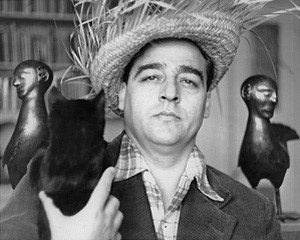
Kenneth Patchen had moved to 377 Green Street in 1951 and hosted poetry readings at his apartment with wife, Miriam, which Dick attended.
The first man who gave me any kind of modern lit guidance (another world of Giono, Celine, Silone, Proust, Nathanael West, even Saroyan and [surprise] Herman Melville…) was Kenneth Patchen and I probably owe him more than I realize.
Dick was fired from Paul Elder's in 1954 and briefly worked for Metro-Goldwyn-Mayer in their northern California business office as a file clerk. He lost this job too for refusing to join the union. Newly married and a young father, Dick needed to find work. Kenneth Patchen suggested that he apply for a job at City Lights and introduced him to Lawrence Ferlinghetti.
In The Beat Goes On (The Idler, 2001), Dick explains how he ended up working at City Lights:
I first noticed City Lights around 1954 when I was working in Paul Elder's bookshop, downtown San Francisco. Walking back to North Beach along Stockton Street, I noticed a dirty window in a tiny shop just across the alley from Vesuvio's, where I sometimes stopped for a drink before going home. The shop had been there all the time, but I had never paid much attention to it. Yet on this nearly forgotten afternoon there was a difference that caught my eye: perched on the ledge inside the Stockton [sic] street window was a single rose in a jam jar and possibly a bowler hat (unless this is a Magritte-inspired memory vision), but definitely inside the dilapidated space were several boxes of books. Then I forgot about it for a while, even after City Lights opened for business. I suppose I must have gone inside a couple of times and possibly even bought a book.
Then I met the poet and master magician, Kenneth Patchen, while I was working at Paul Elder's, building a window display for one of his books. Time passes and I lost my job in the bookstore, soon after finding employment with MGM (in their business office for northern California). It was the closest I've come to working in the movies, and all I did was stick stamps on letters and file invoices. I lost this job too – for not joining the union – and once again I thought I was desperate. Three out of three since arriving in San Francisco; not bad, eh?
Patchen stepped in and suggested I apply for a job at City Lights, giving me an introduction to Lawrence Ferlinghetti. An interview of sorts followed – Lawrence and I talked about books and writing (his and mine) – and I was hired even though Lawrence obviously knew I had been fired from both Brentano's and Paul Elder's.
Dick worked at City Lights from 1954 until 1969. During this time he became friends and poet-in-arms with Ferlinghetti, Allen Ginsberg, Richard Brautigan and other poets, writers and artists of the San Francisco Renaissance and Beat Generation.
He initially worked behind the counter on the front desk and eventually took on more responsibilities, managing the bookstore alongside Ferlinghetti and Shigeyoshi Murao.
A book-clerk I know from long personal experience, is a human Mexican jumping-bean who is both generally underpaid (no offense, Lawrence - we know you're not a supply-sider...) and more knowledgeable than the combination of authors, psychotics, managers, shoplifters, and customers who share his presence in a store during the course of a working-day. He must know books; he must know math, he must be honest; he must be fast; he must use deodorant; he must be pleasant; he must be cool; he must be witty - in short, he must be the all-around hipster. To have satisfied Lawrence, Dick McBride must meet all these qualifications.
In 1956, Kenneth Patchen moved away from North Beach to Palo Alto and Dick and his family moved into his top floor apartment at 377 Green Street, three blocks away from City Lights.
...when the Patchens had moved in the apartment was in terrible shape – big holes in the walls, which Kenneth covered with his paintings, gluing them to the walls so they couldn't be removed without causing even more damage. We probably had more original Patchens on our walls than anyone in town.
During his early years at City Lights, Dick assisted Ferlinghetti in the preparation of Selections from Paroles, a collection of his translations of the poetry of Jaques Prévert.
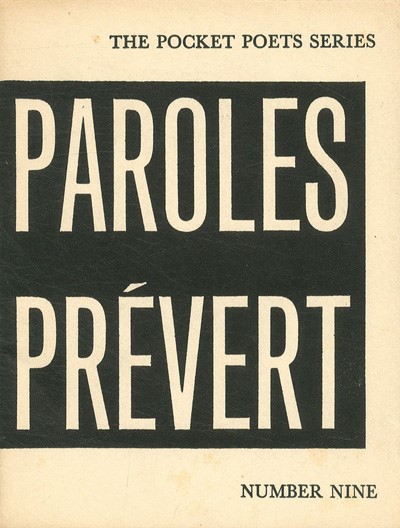
Prévert was an important influence on Ferlinghetti. Ferlinghetti had sent several of his early translations to Peter D. Martin and five of them were published in City Lights magazine before they met.
In Ferlinghetti, A Biography (Doubleday, 1979), Neeli Cherkovski explains that Paroles ...was the result of careful planning. The book included the poems that had appeared in City Lights magazine and some that had never been published. This was the first extensive selection of the French poet’s writings in English.
Ferlinghetti had been working on his translations of Prévert for several years and Paroles wasn't published until he received permission from the French publisher, Gallimard and agreement from Prévert.
Selections from Paroles, the ninth book in the Pocket Poets Series, was published by City Lights Books in 1958. Below his translators note, Ferlinghetti thanks several people, including the poet and translator Marie Ponsot (whose first book of poetry, True Minds, was number five in the Pocket Poets Series), the sculptor Henri Marie-Rose and Dick for their ...aid and information in the preparation of this volume.
In 1957, the year of the Howl obscenity trial, Dick returned to Hastings, Nebraska with his family to finish college aged 30 and received his BA degree from Hastings College in 1958. During this time he worked as a scriptwriter and radio announcer for KHAS Radio.
Between November 1957 and late January 1958, nineteen-year-old Charles Starkweather and his fourteen-year-old girlfriend, Caril Ann Fugate, embarked on an eight day killing spree in Nebraska and Wyoming that claimed the lives of eleven victims. Starkweather was executed by electric chair in Nebraska in June 1959.
The events provided the inspiration for his second collection of poetry, Ballads of Blood (An Impression of the Charles Starkweather Murders), published by Golden Mountain Press in 1961 and Cwazy Man, a short story published in Panurge New Fiction in 1994.
While Dick was in Nebraska, Ferlinghetti had discovered a large basement that had been used to store Chinatown's ceremonial Chinese dragon (immortalised in his poem, The Great Chinese Dragon). Some decades earlier it had also been used as a religious meeting place. With Gary Snyder's help, Ferlinghetti cleared out the basement (leaving the biblical quotations in situ), and used the space to accommodate most of the book stock. The basement also housed a small office and the poetry alcove.
By 1958, City Lights had become a San Francisco literary institution and there were now nine titles in the City Lights Pocket Poets Series. Towards the end of the year, Ferlinghetti tasked Brady Harris and Malcolm Whyte of Troubador Press with printing a new edition of Howl in order to meet the rising demand and to restore the full text as it appeared in Allen Ginsberg's original manuscript - a painstaking process which would take several months to complete.
Dick returned to San Francisco and City Lights in 1959.
Following the publicity of the Howl obscenity trial and the subsequent success of Howl, City Lights had grown as a bookstore and publisher and Ferlinghetti rehired Dick and his brother, Robert to help manage the growth of City Lights and the publishing operation.
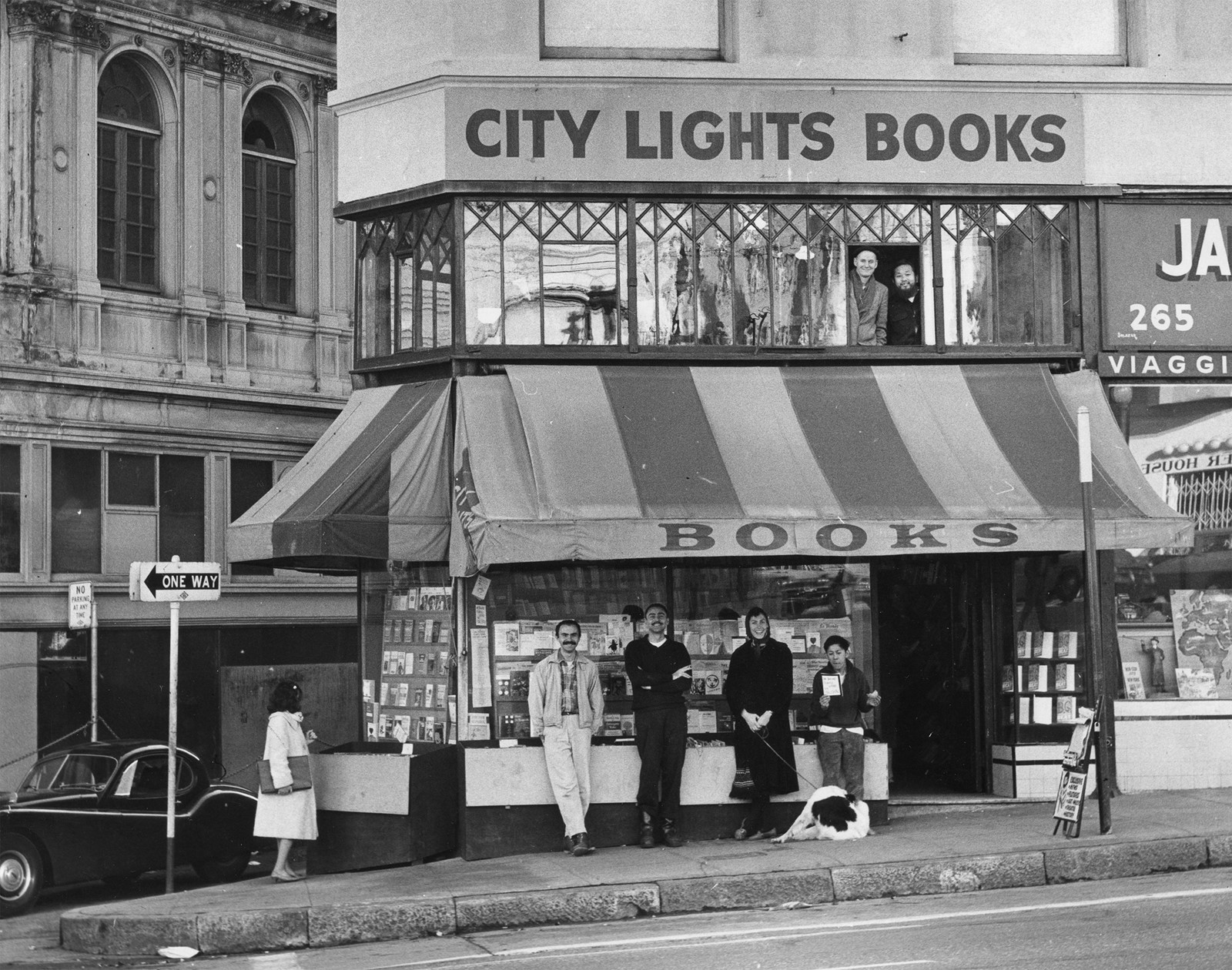
Dick worked as a business manager and managed the publishing side of things with Robert, working as an editorial assistant and developing the City Lights Pocket Poets Series.
He remained involved in the day-to-day running of the bookstore and managed the poetry alcove in the newly opened basement - a section dedicated to work by San Francisco poets, little presses, literary magazines and poetry. It was here that he met many of the poets and writers that he would later represent in England.
City Lights was my home; the customers, employees, visiting writers and assorted gurus and, of course, curious tourists were my friends and relatives.
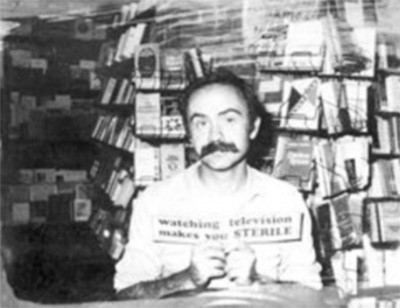
During this time, he lived at Mason Street, North Beach and threw himself into his writing.
In May, his controversial poem St. Francis (Random thoughts of a Protestant Cop) was published in the second issue of Beatitude, a mimeographed magazine conceived by Allen Ginsberg, John Kelly, Bob Kaufman and William J. Margolis as a weekly miscellany of poetry and other jazz designed to extol beauty and promote the beatific life among the various mendicants, neo-existentialists, christs, poets, painters, musicians and other inhabitants and observers of North Beach, San Francisco, United States of America.
St. Francis (Random thoughts of a Protestant Cop) was written in response to Hello, St. Francis by William J. Margolis (the first poem in the first issue of Beatitude) at a time of increasing tensions between the North Beach community and the San Francisco Police Department.
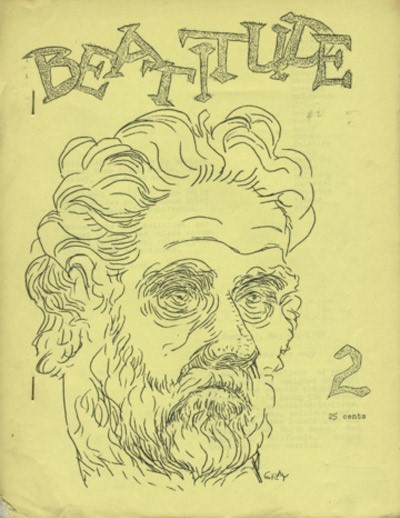
Possibly inspired by Ferlinghetti's Sometime During Eternity from A Coney Island of The Mind (City Lights Books, 1958), Hello, St. Francis is written from the point of view of a North Beach bohemian. St. Francis (Random thoughts of a Protestant Cop), on the other hand, is written from the perspective of a bigoted San Francisco police officer meditating on the city's namesake.
Dick contributed a further twelve poems to Beatitude including: Weeping of the Sun, San Francisco Saturday Scene, Little Bells and Pretty Snow, Now King Come Down From, O Epileptic Boy, Epileptic Boy, World Down Like Dung, There Was This House, How Many Big Things, Specter / August Six, Stones and The Village of Man-eating Wives.
I will never forget the excitement generated by the Bread and Wine Mission when it first began putting out Beatitude. The first editions were run off on an old mimeograph machine, collated and then bound with a staple gun. Hot off the press! Pierre de Lattre and his disciples used to run down the hill to City Lights with the latest edition, dropping off bundles along the way for footsore, wandering poets to hawk on North Beach streetcorners, while keeping a look-out for Bigarani, the Beat-hating cop.
That summer, he participated in a poetry reading at the Upper Grant Avenue Street Fair (now called the North Beach Festival) alongside Cid Corman (founder and editor of Origin), ruth weiss, Helen Adam, C.V.J Anderson (editor of Beatitude), Bill Butler and others.
In fall, Brady Harris collected a marked-up 'censored' edition of Howl from City Lights along with a note from Ferlinghetti to print 5000 copies of the revised edition. Harris and Whyte began the meticulous process of restoring the ellipsed 'dirty words' and in November City Lights launched the post-trial edition of Howl.
Perhaps to avoid stirring up controversy again, Ferlinghetti’s subtle phrase concluding the back-cover copy simply stated: “[T]he present printing contains the full text, exactly as it appeared in the original manuscript.” Without notice from the press, or a peep of protest from the police regarding the changes, HOWL went on to sell more than a million copies in two dozen languages. Its penetrating vision quickened a movement for social reform and made it one of the most widely read books of poetry of its time.
1960s
On February 12th 1960, Dick’s play There And Where was staged at the Telegraph Hill Neighborhood Center, San Francisco and was double-billed with William Saroyan’s Sweeney in the Trees.
His first collection of poetry, Oranges, was published a fortnight later by the printmaker, painter, and craftsman Wilder Bentley at the Bread & Wine Press in San Francisco. It was illustrated with woodcuts by the artist and actor, Victor Wong.
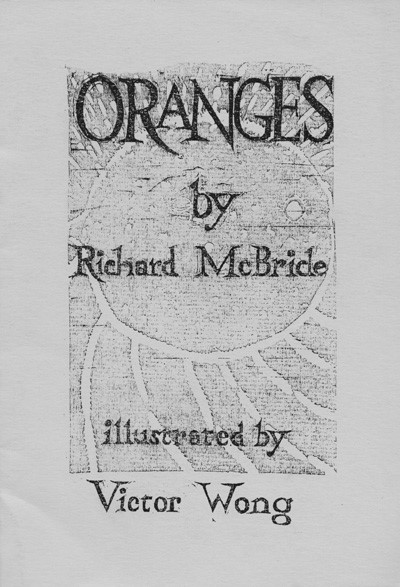
Many of these early poems (eg. San Francisco Saturday Scene, There Was This House, San Francisco: One Way Of Doing It, A Small Green Park, Suddenly Butterflies & Hobblegoblin Time) were inspired by the sights and sounds he experienced walking home from City Lights.
What a crazy walk home, what a notebook for a minor poet like myself: girls; kids; tramps; dogs; cars zooming by; magic-slate sky; great views; Washington Square; the tall church of Saint Peter-and-Paul in the distance-seen just above red-and-white Tic Toc No. 3 sign-Sausalito's midget white houses on the black-green hill by the dark-water bay; and still farther away the Sleeping Lady of Mt. Tamalpais; the sky, always the big sky; gulls flying in the air; and sometimes police, fire or ambulance sirens; and down at the foot of Mason Street the bay again; Fisherman's Wharf; the top of Balclutha old sailing ship; occasionally a big ship coming in; and right in front of our flat, the rickety-noisy-left-over-rackety cable cars going up and down . . . Where else in America could a poet have such a pleasant walk home?
In the same year, Deathman was published in the Beatitude Anthology, an anthology of work from the first sixteen issues of the Beat periodical that was edited by Lawrence Ferlinghetti and published by City Lights Books. Warren French described the collection as: the most important treasury of the San Francisco Poetry Renaissance.
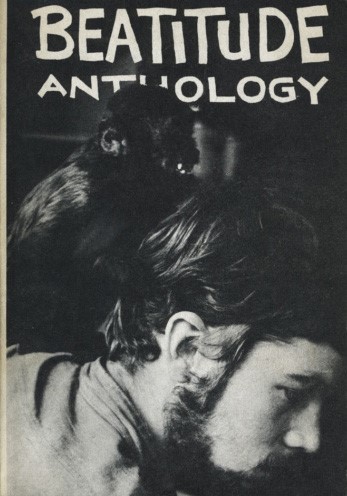
One of his poems was published in the first issue of Shig’s Review, a journal edited by his friend and colleague, Shigeyoshi Murao and published by Adler Press. The first issue also featured a poem by his son, Sean.
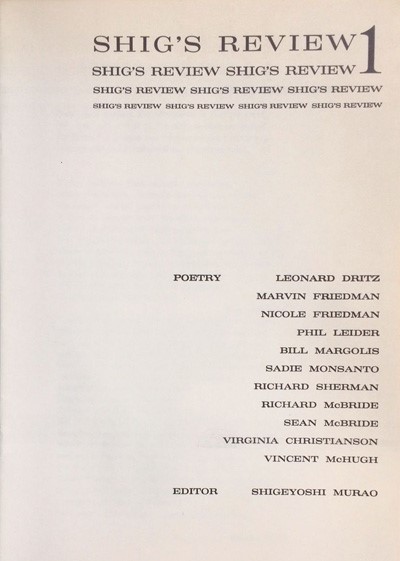
Richard Reynolds, a longtime friend and biographer of Shig, described Shig as a pioneer of the zine movement. The first two issues of Shig's Review were published by Adler Press and the third by City Lights. Subsequent issues were self-published via a photocopier, an approach Dick emulated in later years to self-publish copies of Oranges to sell at his public readings and open house events.
In 1961, Dick’s second collection of poetry, Ballads of Blood (an impression of the Charles Starkweather murders), was published by Harry Graves' Golden Mountain Press, who had published Ferlinghetti's Tentative Description Of A Dinner To Promote The Impeachment Of President Eisenhower in 1958.
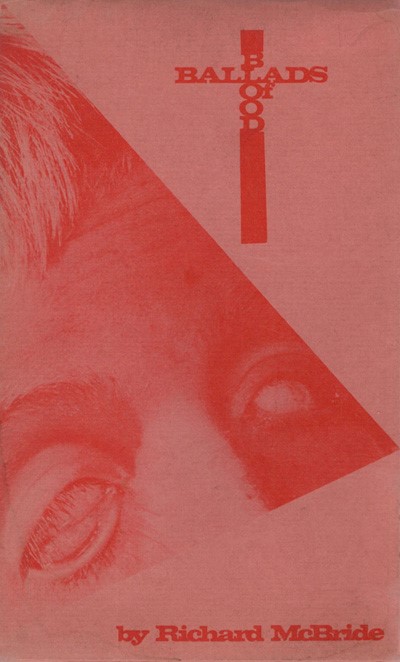
Later that year, his play From Out The Whale’s Mouth was produced by the Bread and Wine Mission at 510 Greenwich Street on Telegraph Hill.
Founded by Pierre DeLattre, a liberal Congregationalist minister, writer and community activist in his twenties, The Bread and Wine Mission was a hub of the San Francisco poetry renaissance, hosting poetry readings, performances and political discussions.
I wanted to have somthing important to write about; so, I decided to spend the first 10-20 years of my life involved in social action, trying to encourage what I thought was a very important movement, the counter culture.
Issues 8 - 16 of Beatitude were published at the Bread and Wine Mission, featuring work by Dick, Allen Ginsberg, Jack Kerouac, Lawrence Ferlinghetti, Philip Whalen, Gregory Corso, Peter Orlovsky, Richard Brautigan, ruth weiss, Lenore Kandel, Diane Di Prima, Bob Kaufman, Jack Micheline, David Meltzer, Pierre DeLattre, Alan Dienstag and others.
The Mission, as it was informally known, was also home to Wilder Bentley's Bread & Wine Press which published four pamphlets of poetry including Dick's first collection of poetry, Oranges, Colloquy by C. V. J. Anderson and 21 Carlisle by Blake Reed. The pamphlets were hand-set and printed by Wilder Bentley on a Chandler Price printing press. The Bread & Wine Press also published the short-lived North Beach literary journal Logos Review.
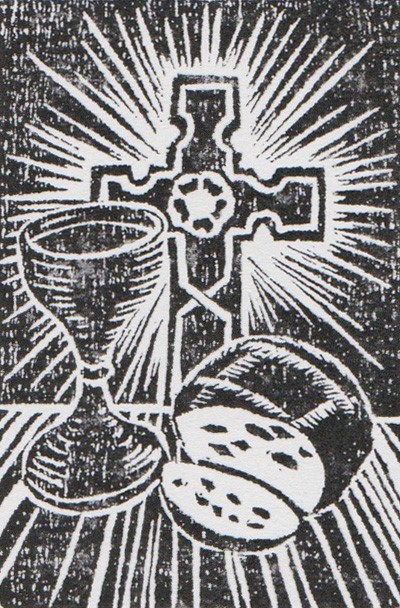
His poems, St. Francis (Random thoughts of a Protestant Cop) and Stones were published in The Real Bohemia: A Sociological and Psychological Study of the “Beats”, by Francis Joseph Rigney and Lemuel Douglas Smith. The poems were featured in Chapter 9 The Case for Creativity, a small anthology of poetry from issues 1-15 of Beatitude.
On October 18th, The Poetry Center at San Francisco State College, under the direction of James Schevill, presented a programme of readings by Dick, Melville Abbett and Frances Crary. The fall season also featured readings by Lawrence Ferlinghetti, John Ciardi, Robert Bly, Denise Levertov and Luis Cernuda.
In January 1962, his work was published in the first issue of Olympia, the first of four issues of the periodical published in Paris by Maurice Girodias’s Olympia Press.
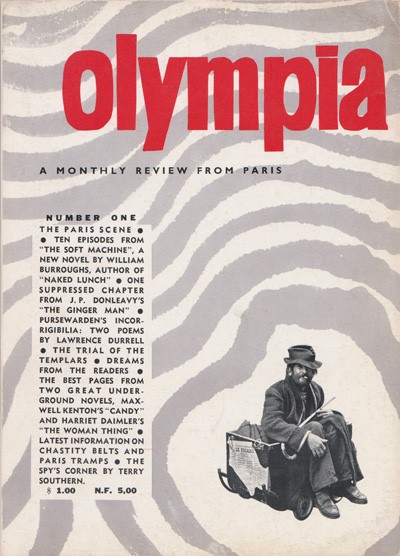
Perhaps inspired by Jack Kerouac's Book of Dreams , an experimental novel based on Kerouac's dream journal that was published by City Lights the previous year, Girodias replaced the traditional letters from the readers with their dreams.
Every month Olympia will publish, instead of the traditional letters from the readers
———their dreams... As this is Number One and we have no readers, we have asked Lawrence Ferlinghetti to advertize our request in his bookstore, in San Francisco:We buy dreams...
Dick provided the first contribution - a surreal account of a dream involving a book purchased from a second hand bookstore in San Francisco, executions on the summit of a bitterly cold, windswept Russian mountain, Fyodor Dostoevsky, Fagin, and a model named Rita Queen.
The first issue of Olympia is notable for including excerpts from William S. Burroughs’ The Soft Machine and a suppressed chapter from J.P. Donleavy’s The Ginger Man.
At the end of the year, The Ballad of the Dead Children was published in the first issue of Root and Branch — A New Radical Quarterly, the first New Left quarterly, edited by Robert Scheer and David Horowitz. Dick wrote The Ballad of the Dead Children after witnessing the flash from one of the atomic detonations at the Nevada Test Site.
In 1963, Haircut Dream was published in the first issue of City Lights Journal alongside work by William Carlos Williams, Allen Ginsberg, William S. Burroughs, Jack Kerouac, Gary Snyder and Lawrence Ferlinghetti, amongst others. Dick edited the journal along with Ferlinghetti and Miles Payne and Robert is credited with Business & Circulation.
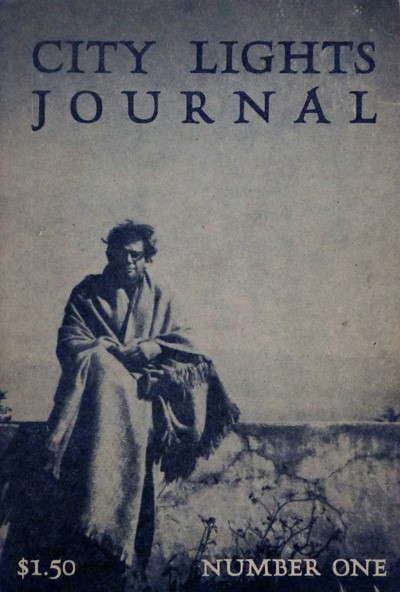
Kulchur, the New American Poetry’s critical arm, wrote:
Two of the young writers involved with visionary experiences are to be taken more seriously. Richard McBride describes a series of wild dream sequences revolving around the appearance and disappearance of Suzy Wong. Going from alley to alley, through many doors, Haircut Dream is reminiscent of the magic circus in Steppenwolfe [sic].
Dick’s first book, Lonely the Autumn Bird: Two Novels, was published by Swallow Paperbooks shortly after the City Lights Journal. The publisher, Alan Swallow, was renowned for taking chances with authors and poets, including Allen Tate, Thomas McGrath and Anais Nin.
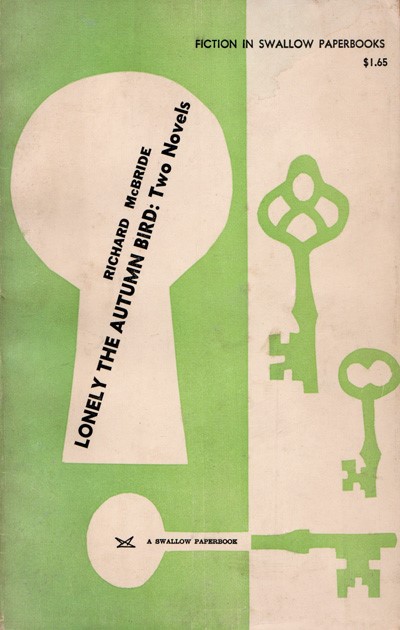
The two novels of this fine book are wonderful discoveries - of a compelling new writer, of characters entirely worthy of a real talent for fiction, and of a scene treated warmly and yet with bitter insight.
The title novel, Lonely the Autumn Bird, set in the
upper South,explores the character and situation of a woman, made empty and pitiable by her culture, and brings the story to a most effective symbolic ending.The second story Tilt, is so aptly titled: for here is the tilt in well meaning characters caught in cultural emptiness. Again, the author finds the meaningful and symbolic overtones to capture his insight and awareness of pathos.
Richard McBride is a young author who has appeared in various magazines, including the new City Lights Journal, with which he is associated.
On February 16th 1964, a recording of Dick reading from Tilt was broadcast on KPFA, a progressive listener-funded radio station based in Berkeley, California.

Later that year, Dick travelled to London for four months to help bohemianize
Better Books.
Tony Godwin, the founder of Better Books and Chief Editor at Penguin Books, had met Ferlinghetti in San Francisco and wanted to make Better Books more like City Lights. He suggested a “work swap” whereby Ferlinghetti would send one of his Beats over in exchange for an English salesman who needed some education.
I came over to England first in 1964 when there was a bookshop in London called Better Books, some of you might remember it. The owner and manager was Tony [Godwin]...who was also the editor of Penguin Books at that time, and he had met Ferlinghetti in the city of San Francisco and came back and said:
I'd like to have a work swap with you Ferlinghetti. You send one of your Beats over to London and I'll send you one of my English salesman who needs a little education.So I went over for four months working, and trying to bohemianize Better Books. I think it worked - for a while anyway.
During his time in London Dick met Tennessee Williams, Samuel Beckett, John Calder and Robert Bly, among others.
In October 1964, Godwin expanded Better Books, opening a coffee shop and paperback bookshop in the adjoining premises on New Compton Street. He hired a string of influential managers including Bill Butler (an American poet who had appeared on the same bill as Dick at the Upper Grant Avenue Street Fair in 1959 and whose work had been published alongside Dick's in the fifteenth issue of Beatitude), Barry Miles and Bob Cobbing.
The paperback bookshop imported paperback titles published by Grove Press, New Directions and Alan Swallow, who had published Dick's first book, Lonely the Autumn Bird, a year earlier. It also stocked the complete City Lights Books catalogue, which City Lights would send over in exchange for second hand copies of Penguin paperbacks.
In May 1965, Better Books became the centre of the British Poetry Revival and the UK Underground when Allen Ginsberg arrived at the bookshop unannounced and offered to read anywhere for free.
Ginsberg's first reading at Better Books was described by Jeff Nuttall as the first healing wind on a very parched collective mind.
In Peace News, Tom McGrath wrote: This could well turn out to have been a very significant moment in the history of England - or at least in the history of English Poetry.
Shortly after Ginsberg's reading at Better Books, plans were hatched for the International Poetry Incarnation.
Meanwhile, back in San Francisco, Dick had started work on his third novel, Memoirs of a Natural-Born Expatriate.
His family had moved to Potrero Hill, livng in Mariposa Street before house sitting for the Ferlinghetti's at 706 Wisconsin while they were travelling in Europe. Ferlinghetti had purchased the Victorian property in 1958 and considered the location to be close enough to North Beach and yet removed from it
.
When Kirby and the children returned earlier than expected, Dick moved to 1312 18th Street, a ten minute walk from the Ferlinghetti's, and lived there until moving to England in 1969.
In The Astonished I, Dick gives a nostalgic account of his time in Potrero Hill with the 'Potrero Hill Gang', recounting softball games with Ferlinghetti at the Jackson Park playground and their annual Pot Hill Kite Flying competitions on an empty parking lot next to the Potrero Hill playground.
In 1966, his third novel, Memoirs of a Natural-Born Expatriate, was published by Alan Swallow.
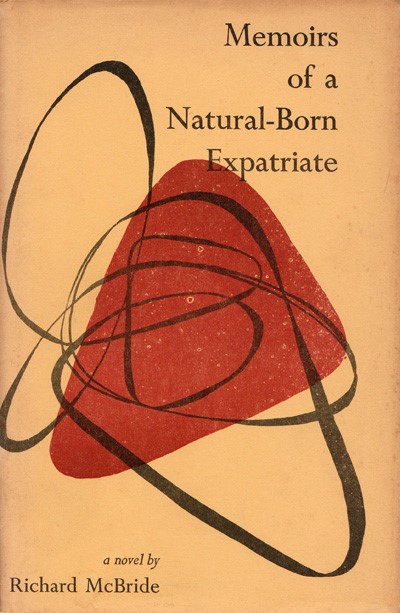
Richard McBride's second book pretends nothing: it is the story of a man who (like the author) works at the famous City Lights Bookshop of San Francisco, knows the people from all over the nation who have come to this famous place as to a sanctuary, and goes home after work to a family of wife and two kids…Memoirs of a Natural-Born Expatriate tells us that we have a new and fine comic writer in our midst.
Alan Swallow, one of the biggest little publishing houses in America
died at his typewriter from a heart attack in December 1966 aged 51. Described as a one man…literary establishment
, Alan was responsible for editing, designing, printing, promoting and distributing the books he published. Warren French was saddened to note that …apparently no one will take over the work he left off.
In 1979, thirteen years later, Swallow Press entered into a licensing agreement with OU Press, but by then Memoirs of a Natural-Born Expatriate had dropped off the radar.
In 1967, City Lights relocated their publishing operation to 1562 Grant Avenue. While Ferlinghetti was recovering from pneumonia that year, Dick rented an apartment at 485 Filbert to use as an editorial office and crash pad for visiting writers. The apartment later served as Allen Ginsberg’s center of operations for his investigations into CIA drug dealing.
Between 1956 and 1967, City Lights Books were distributed in America by the Paper Editions Corporation and, briefly, Bookazine. In 1967, City Lights started doing their own distribution and started distributing other publishers from San Francisco.
The storefront of 1562 Grant Avenue served as the distribution center for City Lights Books and the other small presses. Dick ran this part of the business with his brother Robert McBride and Martin Broadley until 1969.
Later that year, Robert started contacting American publishers about his proposed plan to set up a distribution center for books published by small presses and established McBride Brothers & Broadley International Book Distributors.
Ferlinghetti dropped the little press books due to the extra work involved (and the fact that some of them were taking government money) and handed over the distribution to McBride Brothers & Broadley and others.
In the autumn of 1967 (the tail end of the Summer of Love), Robert and Martin moved McBride Brothers & Broadley over to England to promote and distribute City Lights Books and other small U.S avant-garde publishers in the UK and Europe.
McBride Brothers & Broadley are in England to distribute books to the trade - in England and in Europe. Our list is small, our appeal limited (not to mention our capital), but our enthusiasm limitless. We bring new discoveries and the best of American avant-garde writing and we hope to return the favour by exporting the best English avant-garde to booksellers in the States.
City Lights Books were originally distributed overseas by W.S. Hall & Co. The Scorpion Press (a small publisher who had published the early work of George Macbeth and Peter Porter) became distributors of City Lights Books in Great Britain and Europe in October 1960 and were succeeded by Mandarin Books of London in 1964.
McBride Brothers & Broadley took over the distribution of City Lights Books from Mandarin and began distributing them to the trade in England and Europe from Wood Cottage, a thatched cottage in Great Horwood, Buckinghamshire.
Alongside City Lights Books they also distributed the allied
These included Something Else Press, Leroi and Hettie Jones's Totem Press, Corinth Books, George Hitchcock's Kayak Books, Aurehan Press and others.little press
branch experimental publishers that City Lights encourages.
When we started McBride Brothers and Broadley in 1967, we were like return journey-pilgrims landing at Virgin Rock, England. Bob and Martin spent a lot of time that year visiting many bookshops, contacting friends and libraries, writing letters, managing to get interviewed by the Bookseller. Many people had heard of what was being written and published in San Francisco, but until we got here about the only way of getting a City Lights book was to have a friend bring one over. Again it was a case of being in the right place at the right time.
In 1968, Dick participated in a reading of Jack Rainsberger's poetry. The poems were written while Rainsberger was awaiting execution at Nevada State Prison and were read by a group of San Francisco poets and writers including Dick, Kenneth Rexroth, Lew Welch, Brother Antoninus, George Hitchcock, David Meltzer, Allen Cohen and Sister Mary Norbert. A recording of the reading was broadcast on KPFA on August 27th and was later released as From Deathrow: The Poetry of Jack Rainsberger on cassette tape by Pacifica Programs.
By 1969, Robert and Martin had been working in England for two years laying the groundwork for McBride Brothers & Broadley. Robert suggested that Dick come over to England for two years and then they could swap back and forth taking turns at City Lights and McBride Brothers & Broadley.
Dick and his family moved to England in September. He managed the business with his wife, Betty, who did the paperwork, and his two sons, Sean and Brennan, helped out after school. The business continued to operate from the cottage in Great Horwood and they rented an abandoned Gothic-Victorian Methodist chapel to use as a warehouse.
Still think it’s a kick, all them dirty words (what used to be dirty words before the Beat/Hippie wash was hung out to dry) stored in an abandoned Methodist chapel…
By the time Dick left for England, City Lights Publishers was doing better than the bookstore. Between 1967 and 1969 City Lights published a total of seventeen books. In an interview conducted by David Meltzer and Jack Shoemaker in Spring 1969, Ferlinghetti joked: The bookstore really is unintentionally a nonprofit operation. Like in that old joke. For years the bookstore supported the publishing. Now the publishing is better off than the bookstore.
1970s
About a year and half into Dick's stint in England, Robert and Martin decided they didn't want to be involved with McBride Brothers & Broadley anymore and Dick took over the business.
Bob phoned and said
We don't want it anymore. You can have the business - liquidate it or sell it or something.So I did [sic], and I ended up making a big improvement.
In the summer of 1973, Bernard Stone and Dick hosted a “Fourth of July Party” for Allen Ginsberg at the Turret Bookshop, London. Ginsberg’s Fall of America had been published earlier that year and it seemed appropriate to hold a reading on the birthday of American Independence.
Later that summer, Dick invited Allen Ginsberg to visit him at his home in Great Horwood along with Diana Gravill and Nick Rochford from Compendium Books in London. They visited the old Methodist chapel where the books were stored and Ginsberg advised Dick that his new bookshelf for the New Directions line was too small. As it was a Sunday and the pubs weren’t open yet, Ginsberg suggested that they visit the Church of St James. While Dick, Diana and Nick were looking around the church:
Allen hooked up the organ and sat down and for about half an hour gave a concert of Hebraic sounding, prophetic organ hymns – possibly one of the most unusual guests, organist, prophet, ever to visit old St. James – and no one knew it except the four of us (possibly at the time not even aware of it ourselves) and those friends I've blabbed to since, about the time Allen Ginsberg, world famous obscene holy Beat poet of generation worshiped in the Church of England, for it was worship, if worship means the expression of reverence, if reverence means feeling of awe and admiration, if awe and admiration mean love, if love means close contact with warmth and sensuality and strangely comfort and peace and touching sometimes something thought not possible to touch…
In 1978, Jay Landesman (the writer and publisher who founded Neurotica in the late 1940s and provided an early platform for Ginsberg, Kerouac and John Clennon Holmes), interviewed Dick at his home in Buckinghamshire for the Bookseller.
By the end of the decade, Dick represented over thirty publishers, the majority small presses in America (many of them friends from the old days in San Francisco), the best sellers being New Directions and City Lights. The Methodist chapel housed an impressive collection of 30,000 small press books, earning Dick the title of The Godfather of small publishers.
1980s
Dick McBride, long-time manager and friend of City Lights, has written a memoir of Allen Ginsberg which is a curious and intuitive perception of the poet. Dick knew Allen in and about City Lights during the early years after the publication of “Howl”. He liked Allen a great deal but nevertheless reserved his critical enthusiasm for Allen’s poetry. A struggling novelist himself, Dick wanted both more and less from Allen’s writing. The style and content were both so foreign to Dick, both as a person and a writer (it seemed to me). That is what makes this memoir so interesting and so out of the usual run of writing about the great poet.
The “Fourth of July Party” and Ginsberg’s visit to Great Horwood is commemorated in his biography of Allen Ginsberg, Cometh With Clouds, which was published by Charles Plymell‘s Cherry Valley Editions in 1982.
It contains a foreword by Lawrence Ferlinghetti and is illustrated with photographs of McBride, Ginsberg, Ferlinghetti, Kenneth Patchen, Peter Orlovsky, William and Aram Saroyan and Bernard Stone.
Cometh With Clouds is a deeply personal book. Likely you won’t read a more intimate book about Ginsberg. As well as stories of being with Allen in London bookstores, parties, Allen is to be found walking the streets of the little villages in Buckinghamshire where McBride had relocated from San Francisco to set up his book distribution service McBride & Broadley.
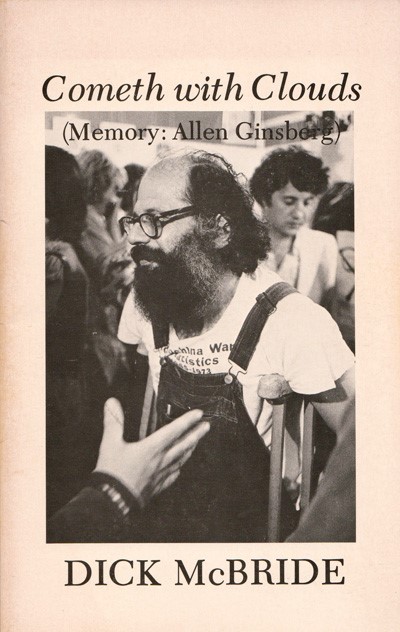
Carl Solomon, the American writer and dedicatee of Ginsberg’s Howl, wrote:
McBride’s memoir of experience shared with Allen is fast, staccato, pungent, rich in nostalgia and written in a very individualistic style: countless phrases dumped into very long sentences – divided by commas, clear and fast-moving. A short book and a lively read. What is perhaps more significant than the book itself is its relationship to the Ginsberg/Beat legendry [sic] which continues to amaze with its persistence…Read McBride’s book. It’s fun.
In 1983, fifteen years after Robert and Martin moved to England, McBride Brothers & Broadley went into voluntary liquidation.
Why did we go under then? Success in every area but the bottom line, i.e., profit. It takes money to make money. We had started the business with very little money and ran with it as far as we could. It was like the last big pot in a poker game we had the chance at winning, but we couldn't find anyone to take our markers. To be honest, I was getting tired, and the alarm clock didn't work anymore.
Dick visited San Francisco in 1985 and met with Allen Ginsberg, Shig and Jack Micheline at the Caffe Trieste, a popular meeting place for Beat writers in the 50s and 60s.
The reunion was photographed by Ginsberg, whose inscription on one of the copies of the photo reads: Dick McBride, returned from England where he’d been distributing City Lights Books, Shig Murao & Jack Micheline facing my shadow through the door of Cafe Trieste, Grant Street San Francisco, March 16, 1985.
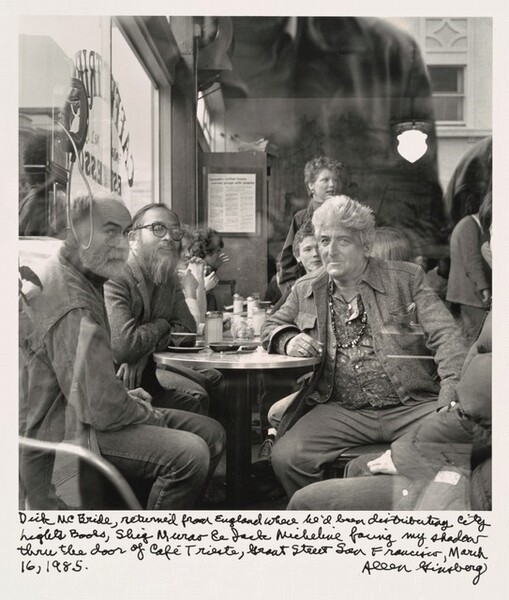
Later that year, Dick moved to Australia with his second wife, Jacqueline Briggs, who he married in 1981. They lived there for three years and Dick spent his time writing and walking the dog.
They returned to England in 1988, settling in West Malvern, Worcestershire. Dick worked at Sherratt & Hughes Books in Worcester for nine months, during which time he arranged a book signing for Lawrence Ferlinghetti who was in the country to promote his novel Love in the Days of Rage.
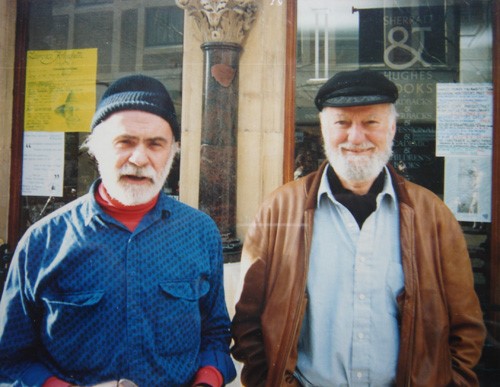
1990s
In 1993, Dick attended Allen Ginsberg's reading at the Cheltenham Literature Festival. Ginsberg was delayed by bad weather and John Calder stalled for time, taking questions from the audience and reminiscing about Ginsberg. Calder soon ran out of steam and, as the audience was getting restless, Dick stepped in:
Before I could take over where John had left off a member of the audience called out a request that I read William Carlos Williams' introduction to Howl, which I did and just as I finished the audience broke into applause. My first thought was, Heck, I know I read well, but I wasn't that good, when I looked up and saw Allen approaching the stage...
In 1995, Dick published his fourth novel , The Astonished I (Memories & Wet Dreams), under his McBride’s Books imprint. It contains an introduction by Charles Plymell and is dedicated to his friend Tim Prael, who features prominently in the novel.
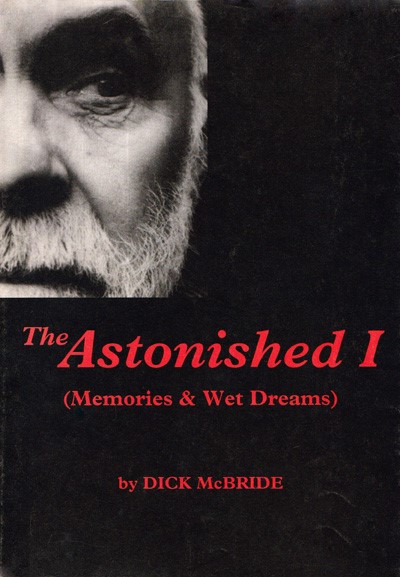
The Astonished I, a recollection of the authors time in San Francisco in the 50s and 60s, is comprised of a series of sketches of events in and around City Lights, North Beach & Potrero Hill.
It features first-hand memories of City Lights, Kerouac, Ginsberg, Ferlinghetti, Kenneth Rexroth, Brendan Behan, William Saroyan, various North Beach characters and the sinister men in bowler hats.
It's about San Francisco and City Lights in the 50s and 60s. It's nostalgic and probably absolute nonsense - the part left out by eminent historians and prominent poets, in other words - true, unvarnished lies.
The title of the novel is a play on words of Kenneth Patchen’s An Astonished Eye Looks Out Of The Air (Untide Press, 1945), the inspiration for the City Lights Pocket Poets Series cover design.
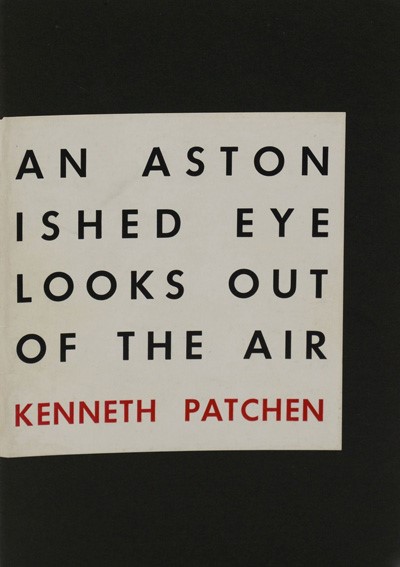
In the same year, How Many Big Things from his first collection of poetry was published in Beat Voices: An Anthology of Beat Poetry (Henry Holt, 1995), a collection of American poetry by and about the Beat Generation edited by the poet and novelist David Kherdian.
In January 1996, Dick published Michael Wilding's Somewhere New: New & Selected Stories. Wilding was a writer and academic who co-founded Wild & Woolley, an Australian small publisher and the Australian agent for City Lights Books, New Directions and Black Sparrow Press in the 70s and 80s.
On October 1st, Dick's second wife, Jacqui, passed away.
She loved beauty, found it everywhere; it was her inspiration. She made you feel special; being with her, in her presence, was a celebration. Her eyes were grey. although sometimes they seemed to be blue. She had an unbelievable smile; she knew she was happy. She was lovely; she was my wife.
In November 1996, Dick was a guest at the Conegliano Poetry Festival, where he read his poetry alongside Yevgeny Yevtushenko, Andrey Voznesensky and Roger McGough. The two and a half day festival was organised to honour City Lights and the Beats and to celebrate Allen Ginsberg’s 70th Birthday.
In February 1997, em writing and music, a new publication dedicated to promoting progressive new writing, new music and graphic art
, published a selection of Dick’s flash fiction stories and prose poetry.
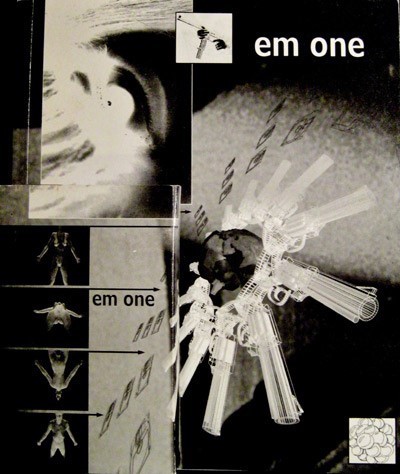
Dick's contributions included: Fleur-de-lis, The Soft Watch, What’s So Good About Friday?, Mysterium, Step Right Up, Folks!, Stand Up Comedian, Picasso Couldn’t Say it all in Guernica, The Greatest Story Never Told, Enough To Try the Patience of a Saint, The House that Jack Built, Satie-Faction (originally published by Martin Wheeler in 1993) and an excerpt from Lady Day Dies, a poem about the death of Billie Holiday.
Later that year, Dick published Jacqui (Love Poems), his third collection of poetry. Originally privately produced in 1994, Jacqui (Love Poems) is a collection of poems dedicated to his second wife. The epigraph is taken from Kenneth Patchen's The Concerns of the Heart.
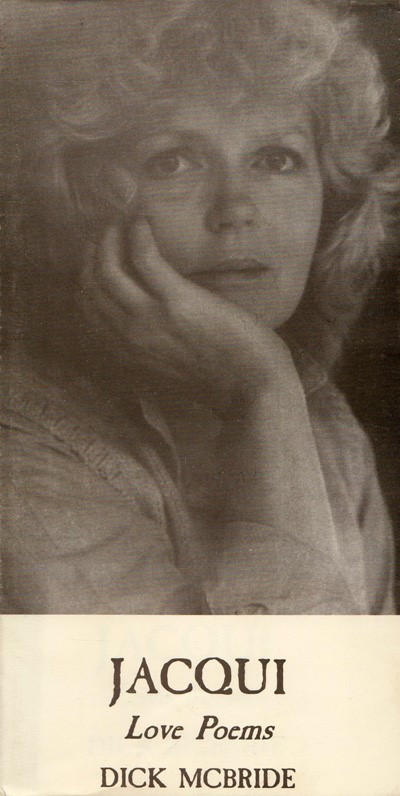
In October 1999, his short story Garden was published by Tim Gaze's Annihilator Press in Adelaide, Australia. Garden was written while Dick was living in Australia in the 1980s. The story is set in the garden of the apartment Dick shared with Betty, Robert and Martin in August Alley, San Francisco in 1953. It is illustrated by Andrew Stattman and dedicated to Michael Wilding.
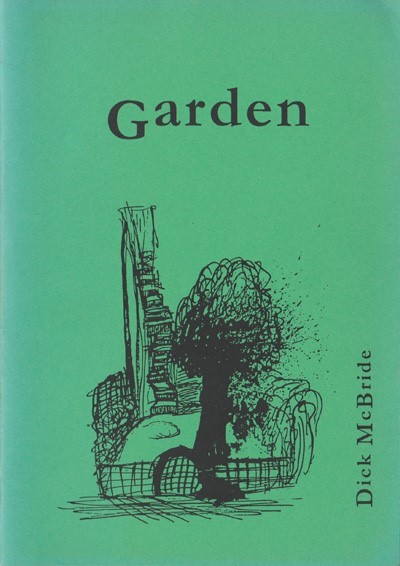
2000s
In 2000, Stardust, Kiss, Moth and When Summer (four prose poems) and from Apocrypha (a short story) were published in the fourth volume of the Rue Bella. The Rue Bella was published by Nigel & Geoff Bird between 1998 and 2003 and featured work by Michael Horovitz, Brian Patten, Ruth Padel and Benjamin Zephaniah among others. It also provided a platform for the up-and-coming writers of the period, including author and journalist Benjamin Myers.
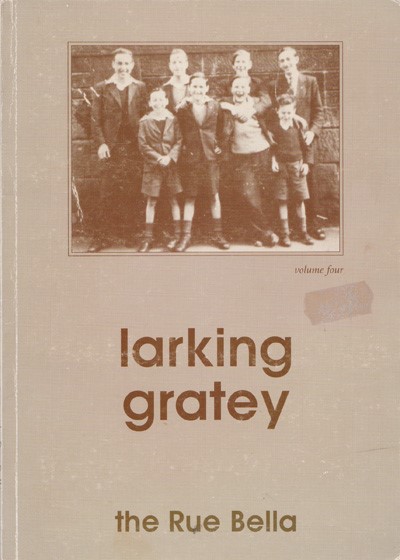
Between 2000-2001, Dick collaborated with Celluloid on the Last Beat project, a live and recorded performance project that received airplay on BBC Radio 3’s Late Junction. A UK tour followed, including a performance at Birmingham ArtsFest and an Oxfam benefit concert held in Priory Park, Great Malvern.
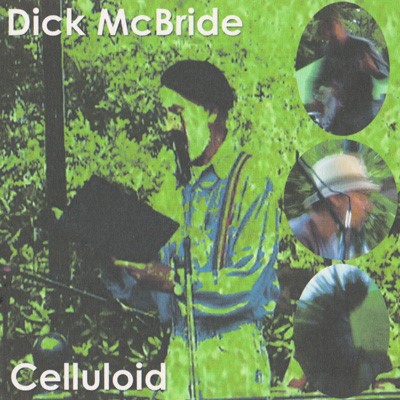
In 2001, Dick headlined the Leeds Voice Festival of New Writing, a 10-day festival of live literature, providing a platform for emerging spoken word artists.
Depression Waitress Blues, an excerpt from, Flop (his unpublished novel about the McBride family during the Great Depression that morphs into a story about John Dillinger), was published in As High As The Bullet Holes, the sixth volume of the Rue Bella.
In September, he participated in an event held in Great Malvern as part of a highly publicised international campaign to release Ngawang Choephel, a Tibetan ethnomusicologist and documentary filmmaker detained by the Chinese authorities in 1995.
Dick had been deeply affected by the events of September 11th, but felt it was important to do what he could to help highlight the plight of Choephel, especially as the world's attention was on America.
Ngawang Choephel was released on medical grounds in 2002 after serving six-and-a-half years of his 18-year sentence.
In 2004, his fourth collection of poetry, Remembered America, was published by Rue Bella who described the book as: …an uplifting reminder of the transcendent thrill of Beat poetry, mixed with a maturity hard earned by McBride in his long and colourful life
.
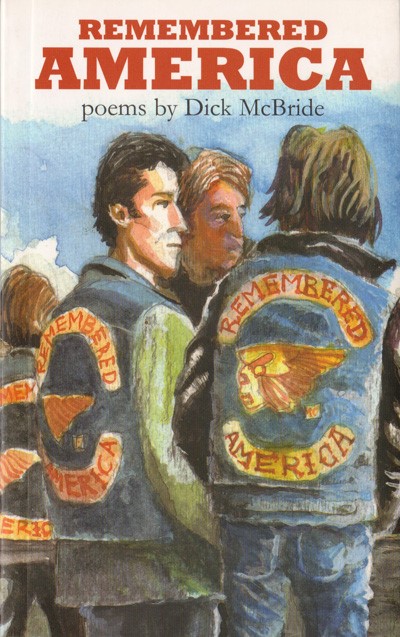
Essentially two collections in one book, Remembered America is divided into two parts: One Morning in Paradise and Approaching the Year 2012. It is dedicated to his good friend and fellow writer Patricia Gerrard who he shared his life with at the foot of the Malvern Hills in Colwall, Herefordshire.
In an interview with the Malvern Gazette, Dick said that the contrast between the paradise feeling he gets when on the hills and in Colwall, with terrorism since the September 11 attack was a theme of the book
.
The writer and poet, Philip Callow wrote:
I have long admired his energy and his stubbornly hopeful vision against all the odds…I am especially taken with
Grass, it’s haunting refrain running through what is both an elegy and a rhapsody. In general I am gladdened by writing that can be wild like Ginsberg and is never far from ecstasy.
Looking back, Nigel Bird (editor of Rue Bella) recalled:
Remembered America was our last hurrah. Dick McBride had done the rounds. He'd worked in City Lights and been at the hub of the Beat poetry movement from its birth.
Like the Rue Bella itself, he wasn't one of the biggest fish, but he did have teeth and heart. As much as it was our final effort, it was also destined to be his. I think he had a desperate urge to publish one more grand work and we were the people who were able to grant him that.
In August 2006, he headlined the Words In Motion stage at the Big Chill Festival in Herefordshire. As well as reading a selection of his poetry, Dick talked about his early days in San Francisco, the Bread and Wine Mission, his sojourn at Better Books and McBride Brothers & Broadley.
In 2008, Charlie Stewart recorded and produced UpBeat and Groovy: Dick McBride Reads Poems 1960-2008. Recorded at his cottage in Herefordshire, UpBeat & Groovy is an anthology of poetry that Dick most often chose for his public readings. The poems draw inspiration from the joy of city life in San Francisco in the 50s & 60s, the tranquillity of the Malvern Hills, and the darker themes of mortality and terrorism.

On January 21st 2009, Dick headlined “The British Beat” poetry reading, part of the Jack Kerouac: Back On The Road exhibition at the Barber Institute of Fine Arts, Birmingham. The event was curated by Professor Dick Ellis and also featured readings by Jim Burns, Ian McMillan, David Tipton & Camelia Elias.
Dick McBride died peacefully at his home in Colwall, Herefordshire on Tuesday 28th August 2012.
Notes
This biographical sketch is a work in progress and is pieced together from conversations with Dick and supplemented with my own research.
If you have any information or questions regarding Dick’s life and work please feel free to contact me at:
theastonishedi@gmail.com
Rob McDowall
Acknowledgements
My thanks and appreciation to Sean McBride, Peter Hale (Allen Ginsberg Estate), Stacey Lewis (City Lights), Malcolm Whyte (Troubador Press / Word Play Publications), Kevin Ring (Beat Scene) and N. Savage (Beatitude Poetry) for their time and help.
Bibliography
- Amnesty International (February 14, 2000). China (Tibet): Medical letter writing action: Ngawang Choephel. Amnesty International.
- Amnesty International UK (May 25, 2001). Tibetan Musician Case Mark 40 Years of Human Rights. Amnesty International UK.
———(January 22, 2002). CHINA: Release of Tibetan prisoner of conscience welcome but authorities must do more. Amnesty International UK.- Belen, Terry Mulert (October 23, 2022). Farewell to Pierre. Ortenstone DeLattre Fine Art.
- Bellamy, Bruce, E. (1980). Private Presses & Publishing in England Since 1945. K.G. Saur.
- Bills-Geddes, G. (February 29, 2008). Grand Old Man of the Beat Generation. Malvern Gazette.
- Bird, Nigel (April 18, 2010). The Rue Bella Magazine (1998 - 2003). Sea Minor.
———(July 20, 2020). Remembered America. Sea Minor.- Burns, Jim (August, 2020). Bill Butler and The Unicorn Bookshop by Terry Adams Reviewed by Jim Burns. The Northern Review of Books.
- Cherkovski, Neeli (1979). Ferlinghetti: A Biography. New York: Doubleday.
- Clay, Steve (2016). from A Secret Location. Granary Books.
- Cook, Ralph, T. (1982). The City Lights Pocket Poets Series: A Descriptive Bibliography. La Jolla, Calif. : L. McGilvery/Atticus Books.
- Dery, Mark (September 5, 2015). Lawrence Ferlinghetti and the Romance of City Lights. Daily Beast.
- Dossey, Steve & Wood, Donna (1982). An Interview with Pierre DeLattre. Beat Angels: Volume 12 of The Unspeakable Visions of The Individual. Arthur and Kit Knight.
- Heneghan, Donald, A. (2005). City Lights Pocket Poets Series 1955-2005: From the Collection of Donald A. Heneghan. The Groiler Club.
- Ferlinghetti, Lawrence (ed.) (1963) City Lights Journal Number One. San Francisco: City Lights Books.
- Ferlinghetti, Lawrence & Morgan, Bill (2003). The Beat Generation in San Francisco: A Literary Tour. San Francisco: City Lights Books.
- Ferlinghetti, Lawrence & Peters, Nancy J. (1980) Literary San Francisco: A Pictorial History from Its Beginnings to the Present Day. San Francisco: City Lights Books and Harper & Row.
- French, Warren (January 8, 1967). But Must Alan Swallow's Dream Die Also? The Kansas City Star.
- French, Warren G. (1991). The San Francisco Poetry Renaissance. Twane.
- Girodias, Maurice (ed.) (January 1962) Olympia Number One. Paris: Olympia Press.
- Hornick, Lita (ed.) (1964). Kulchur 14. Kulchur Press.
- Kamiya, Gary (March 15, 2015). Police Officer William Bigarani came down hard on beatniks. San Francisco Chronicle.
———(March 20, 2015). Beatniks’ battle with S.F. police goes national with poems. San Francisco Chronicle.- Kamstra, Jerry (1976). The Frisco Kid. New York: Bantam Books.
- Kherdian, David (1995). Beat Voices: An Anthology of Beat Poetry. Henry Holt.
- Kirch, Clare (September 13, 2013). Ohio University Press Rebrands Trade Imprint. Publishers Weekly.
- Lafferty, Jo (March 5, 2004). Dick McBride in Review: The Chase. Worcester News.
- Landesman, Jay (September 2, 1978). A Site for Small Presses. The Bookseller. J. Whitaker.
- May, John (May 20, 2012). Bill Butler & the Unicorn Bookshop + Better Books. The Generalist.
- Meltzer, David & Shoemaker, Jack (2001). San Francisco Beat: Talking with the Poets. San Francisco: City Lights Books.
- McBride, Dick (1982). Cometh With Clouds (Memory: Allen Ginsberg). Cherry Valley Editions.
———(1995). The Astonished I. Colwall: McBride's Books.———(1995). Whizzkiddery. The Three Rope Trick: Panurge New Fiction 22. Panurge Publishing.———(1996). Dick McBride THE ASTONISHED I. Café Royal: Panurge New Fiction. Panurge Publishing.———(1997). Jacqui (Love Poems). Colwall: McBride's Books.———(1999). The Garden. Adelaide: Annihilator Press.———(2001). Allen Ginsberg & The Blue Rinse Brigade. Urthona.———(2001). The Beat Goes On. Hodgkinson, T. (ed.) The Idler.———(2006). Live at the Big Chill (Ltd CD-R). Sean McBride.- McBride, Richard (1963). Lonely The Autumn Bird; Two Novels. A Swallow Paperbook.
———(1966). Memoirs Of A Natural-Born Expatriate. Alan Swallow.- McBride, Robert (January 27, 1968). We Are Hoping To Make The Scene Here. The Bookseller. J. Whitaker.
- Miles, Barry (1989). Ginsberg: A Biography. London: Viking Penguin.
———(2002). In the Sixties. Cape.———(2010). London Calling: A Countercultural History of London Since 1945. London: Atlantic Books.- Monroe, Harriet (ed.) (1961). Poetry: October 1961 - Volume 99 - Number One. Modern Poetry Association.
- Moréteau, Constance and Pleasance, Simon (Translator) (May 2019). Living and Rebellious Bodies: Publications as Seen by Artists in the 1960s and 1970s. Critique d'art 52 Spring/Summer. Open Edition Journals.
- Morgan, Bill (1982). Lawrence Ferlinghetti A Comprehensive Bibliography to 1980. Garland Publishing.
- Nelson, W. Dale (2010). The Imprint of Alan Swallow: Quality Publishing in the West. Syracuse University Press.
- Nuttal, Jeff (1968). Bomb Culture. MacGibbon & Kee Ltd.
- Pacifica Foundation (February, 1964). KPFA Folio. Volume 14. No. 23. Berkeley: KPFA.
- Pacifica Tape Library (1971). Pacifica Programs 1971 Catalog. Berkeley: Pacifica Tape Library.
- Prevért, Jacques and Ferlinghetti, Lawrence (Translator) (1958). Selections from Paroles. San Francisco: City Lights Books.
- Pulley, Michael (October 18, 2001). The Last Days of Victor Wong. Sacramento News and Review.
- Ralph, George W. (1981). The Book of Jonah as a Source for Drama in the English-speaking Theater. Michigan: Michigan State University. Department of Theatre.
- Ravnikar, Michelle Barret (1986). Reporting a Mass Murder: Coverage of the Charles Starkweather Case by the "Lincoln Star" and the "Omaha World Herald". The University of Montana.
- Reynolds, Richard (October 3, 2011). Shig Murao: The Enigmatic Soul of City Lights And The San Francisco Beat Scene.
———(October 3, 2011). Shig Murao: The Enigmatic Soul of City Lights And The San Francisco Beat Scene. ZYZZYVA.- Raymond Danowski Poetry Library: Digital Danowski (2016). Networking the New American Poetry. Emory University.
- Rigney, Francis J. and Smith, Lemuel D. (1961). The Real Bohemia: A Sociological and Psychological Study of the "Beats". New York: Basic Books.
- Ring, Kevin (February 16, 2024). More Beat Scene First Words. Beat Scene Press.
———(Winter, 2024). McBride Brothers & Broadley. Beat Scene. No. 109. Winter 2024. Beat Scene Press.- Roberts, Coleman (April, 2001). The Bread and Wine Mission: Spirituality, Poetry and Rebellion in North Beach. (PDF) Outside Lands Volume 17, No.2 Apr-Jun 2021. Western Neighbourhoods Project.
- Rosemont, Franklin (2003). An Open Entrance To The Shut Palace Of Wrong Numbers. Surrealist Editions.
- Savage, N. (2007) Beatitude Magazine. Beatitude Poetry.
- Schmaltz, Romalyn (2019). Upper Grant Avenue Street Fair--An Oral History. FoundSF.
- Silesky, Barry (1990). Ferlinghetti: The Artist in His Time. New York: Warner Books.
- Sinclair, Ian (ed.) (2006). London: City of Disappearances. Hamish Hamilton.
- Smith, Larry R. (1983). Lawrence Ferlinghetti: Poet-at-Large. Carbondale. IL: Southern Illinois University Press.
- Solomon, Carl (March 1983). The Poetry Project Newsletter #97. (PDF) The Poetry Project.
- Stanford University. Dramatists' Alliance (1953). Bulletin of the Dramatists' Alliance. Stanford: Dramatists' Alliance.
———(1954). Bulletin of the Dramatists' Alliance: Competitions and Assembly. Stanford: Dramatists' Alliance.- Swallow, Alan (1974). Publishing in the West: Alan Swallow: Some Letters and Commentaries. Santa Fe: Lightning Tree.
- Taos News (October 24, 2022). Pierre DeLattre. Taos News.
- The Allen Ginsberg Project (October 15, 2016). Allen Ginsberg in London 1965. The Allen Ginsberg Project.
———(May 27, 2017). Allen Ginsberg at Cheltenham 1993. The Allen Ginsberg Project.———(March 3, 2022). Dick McBride on Allen Ginsberg. The Allen Ginsberg Project.- The Book Club of California (Summer, 1960). Quarterly News Letter. Volume 25. Summer 1960. No. 3 The Book Club of California.
- The Bookseller (December 9 1967). City Lights and Something Else. The Bookseller. J. Whitaker.
- The Players Magazine (1959). The Players Magazine. Volumes 36 - 37. National Collegiate Players.
- Time (December 20, 1954). Spain: The Midget & The Elephants. New York: Time Inc.
———(June 29, 1959). Religion: Far-Out Mission. New York: Time Inc.- Wabash College (1974). Indiana Authors and Their Books 1917-1966. Indiana: Wabash College.
- Wallace, Emily M. (1968). A Bibliography of William Carlos Williams. Wesleyan University Press.
- Whyte, Malcolm (Fall, 2008). Making Howl Whole or How Troubador Press Restored the Dirty Words to an American Epic Poem. Quarterly News Letter. Volume 73. Fall 2008. No. 4 The Book Club of California.
———(September 22, 2022). Collecting and Sharing Edward Gorey’s Artwork Edward Gorey Charitable Trust.- Williamson, Marcus (March 10, 1996). Kenneth Patchen Home Page.
———(October 25, 2012). Dick McBride: One of the Last of the Beat Poets. Independent.
